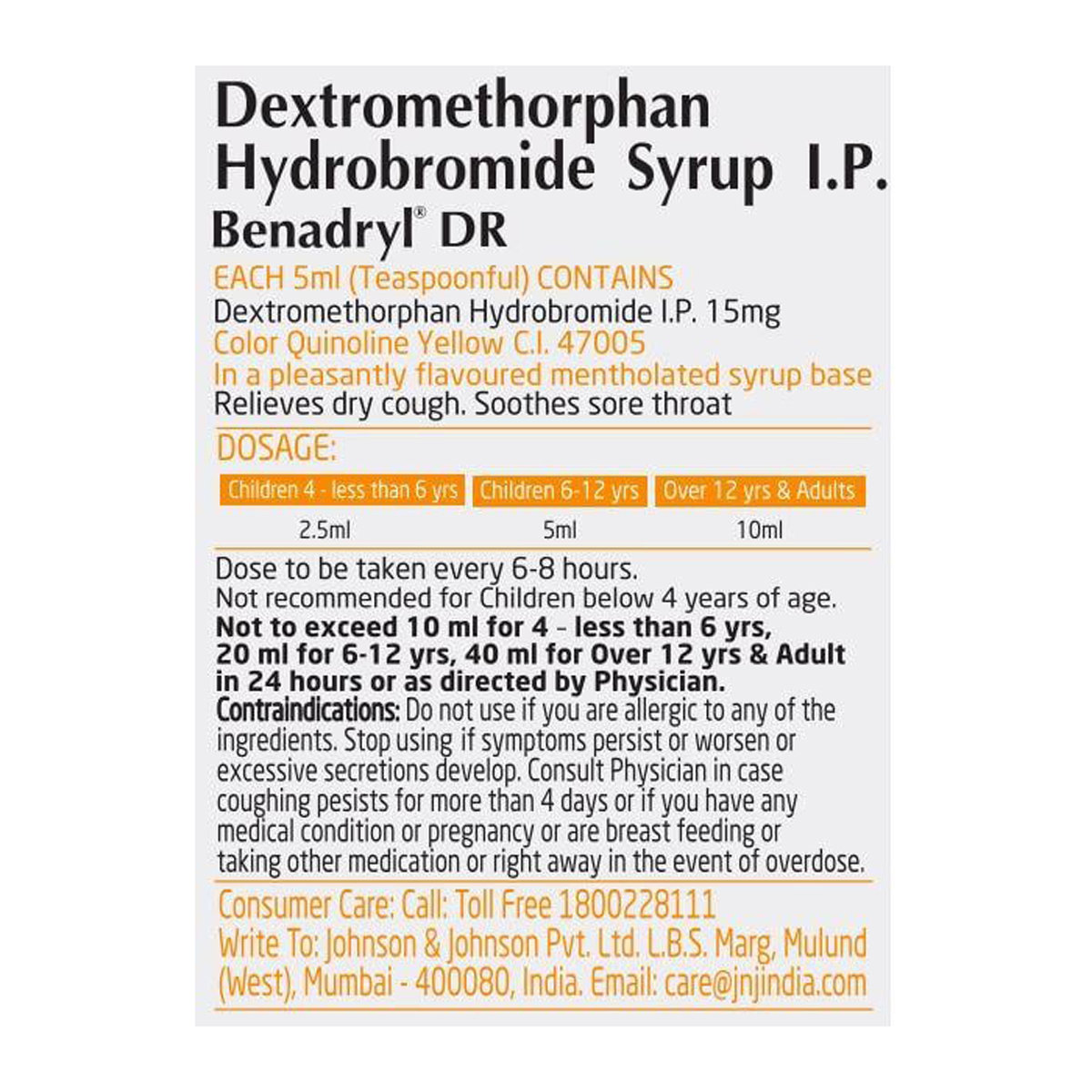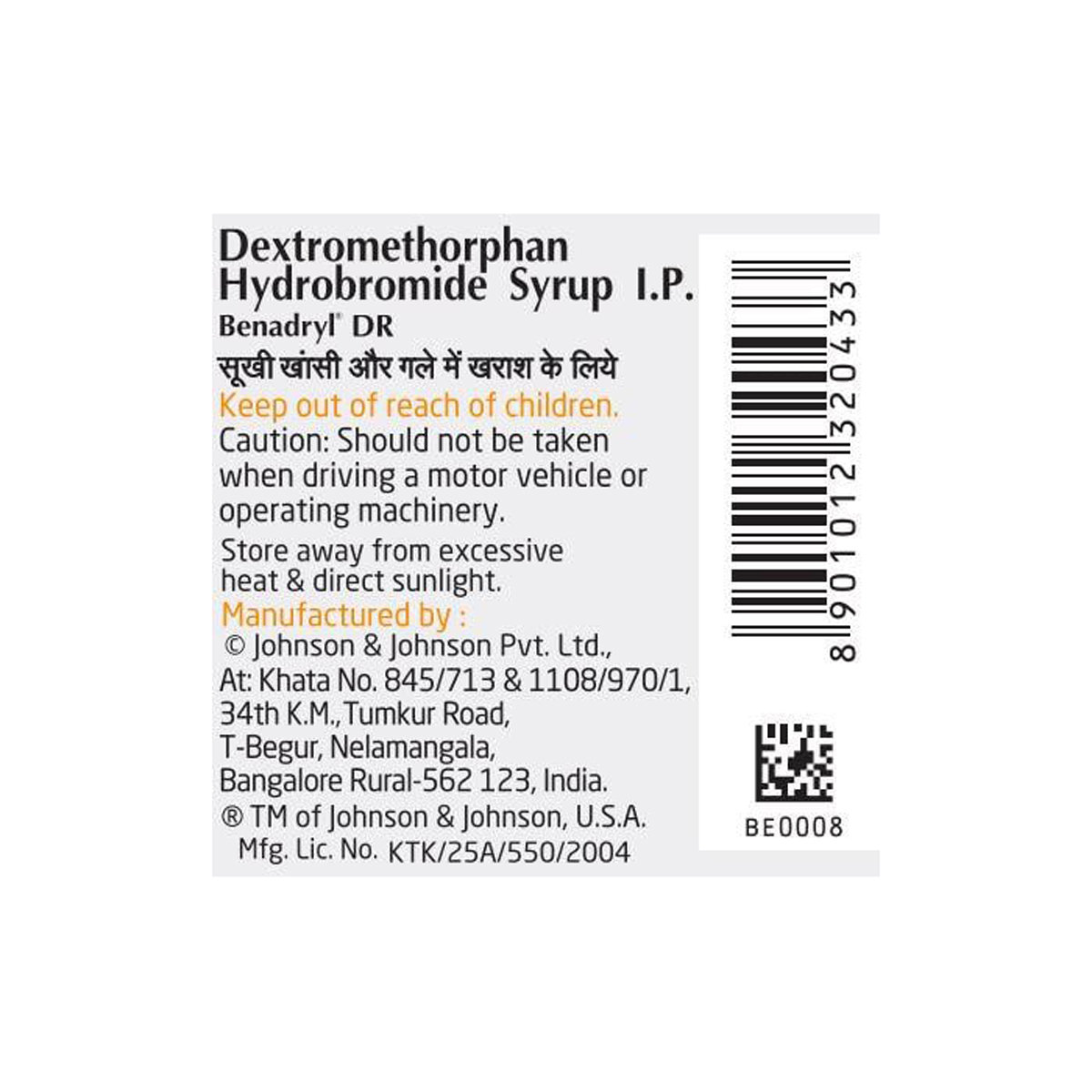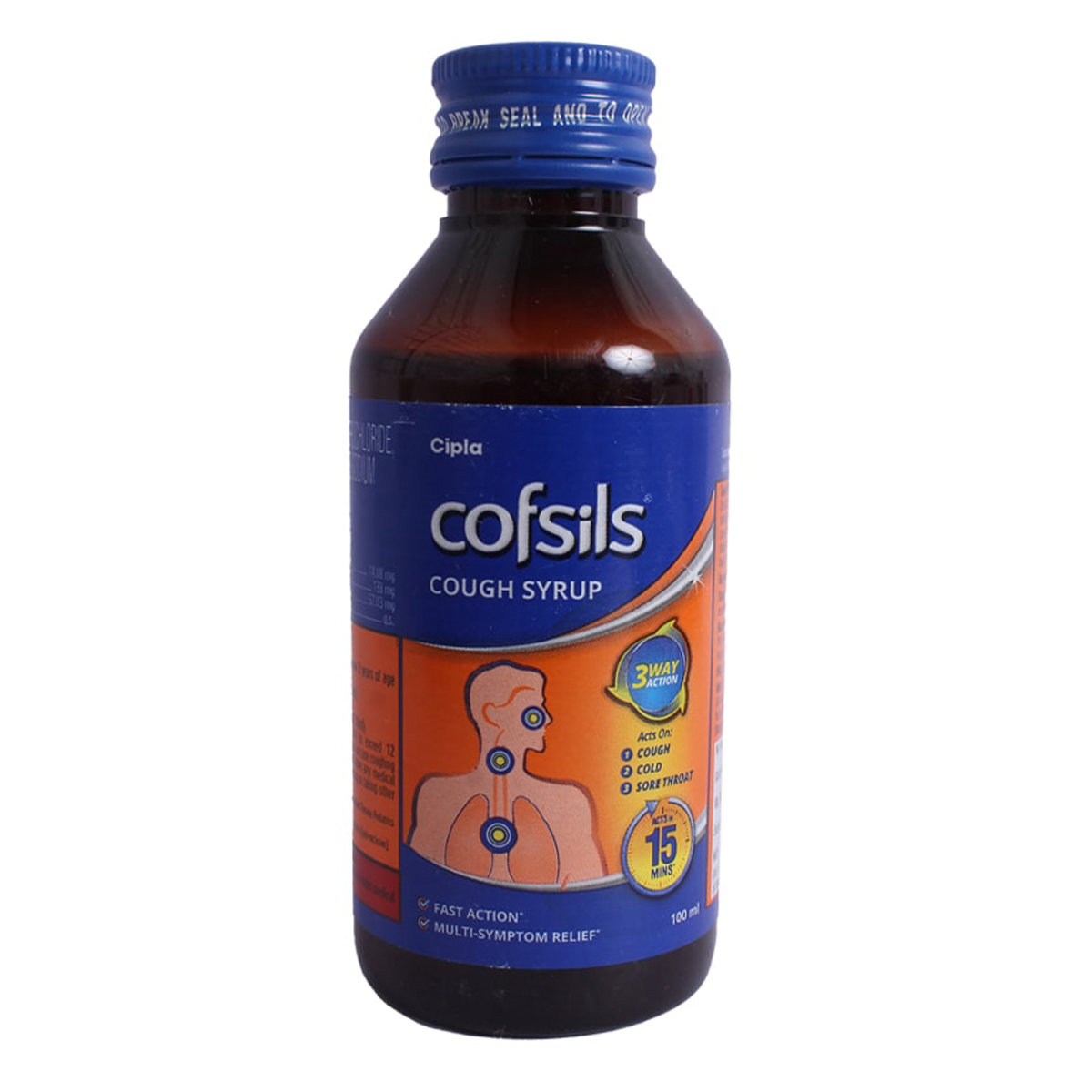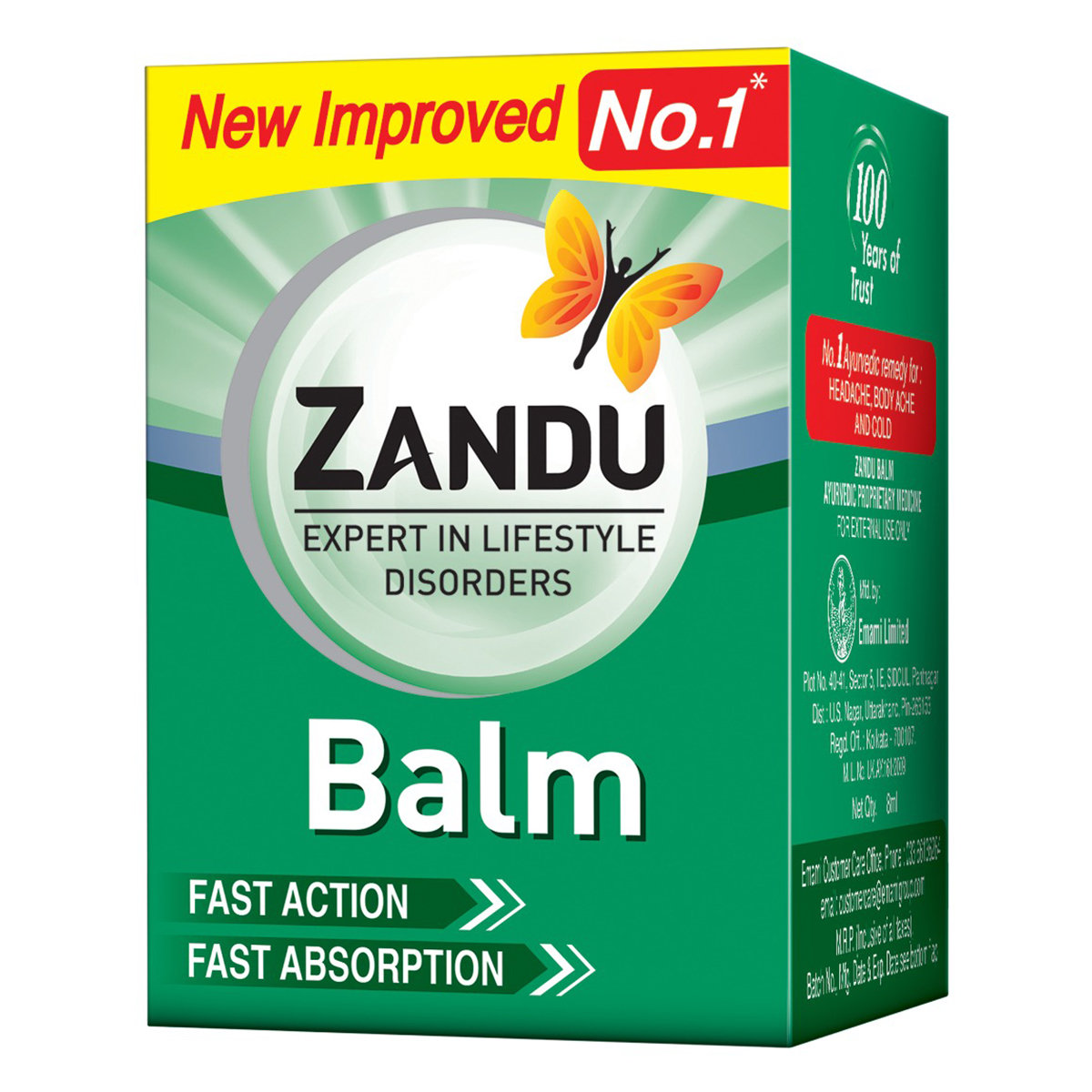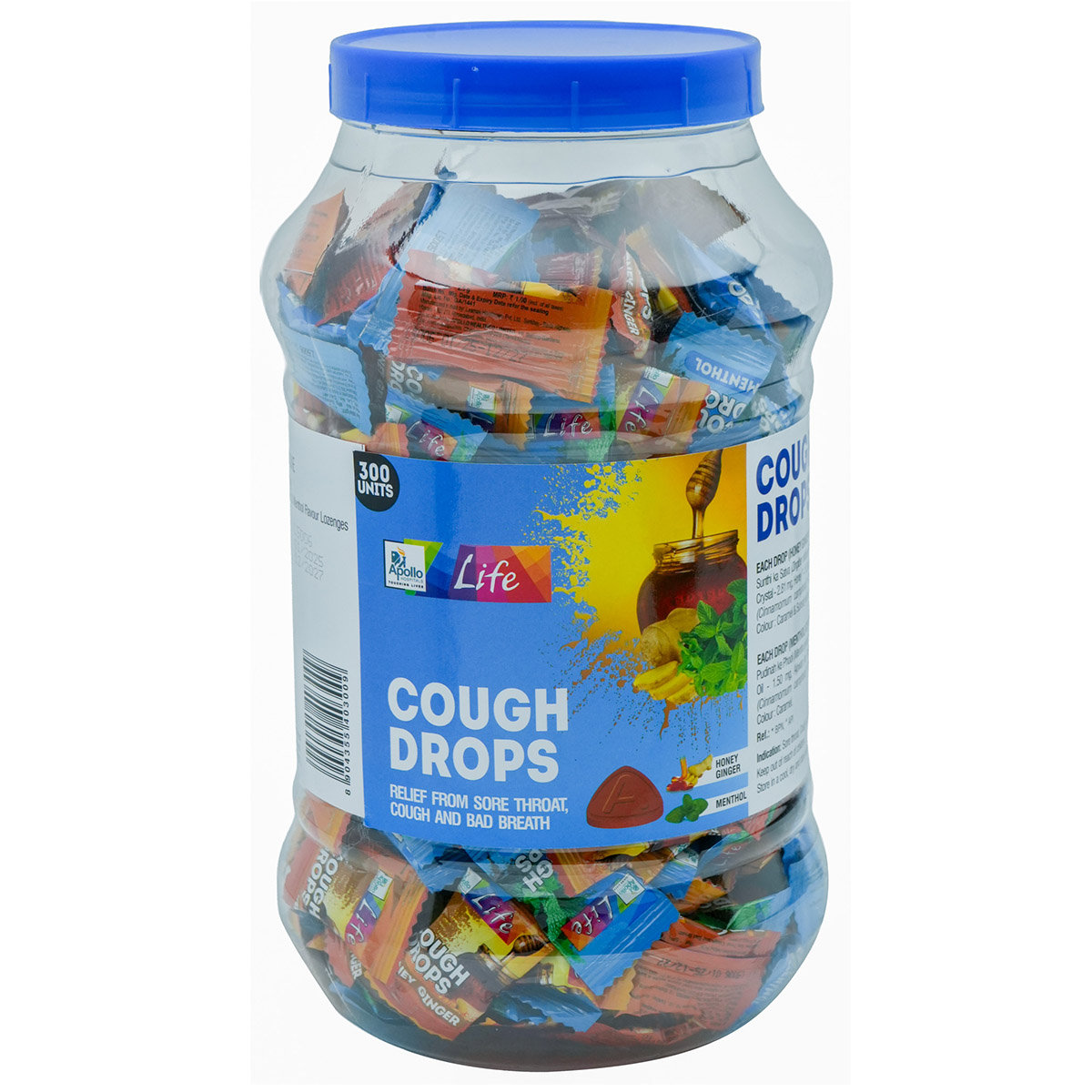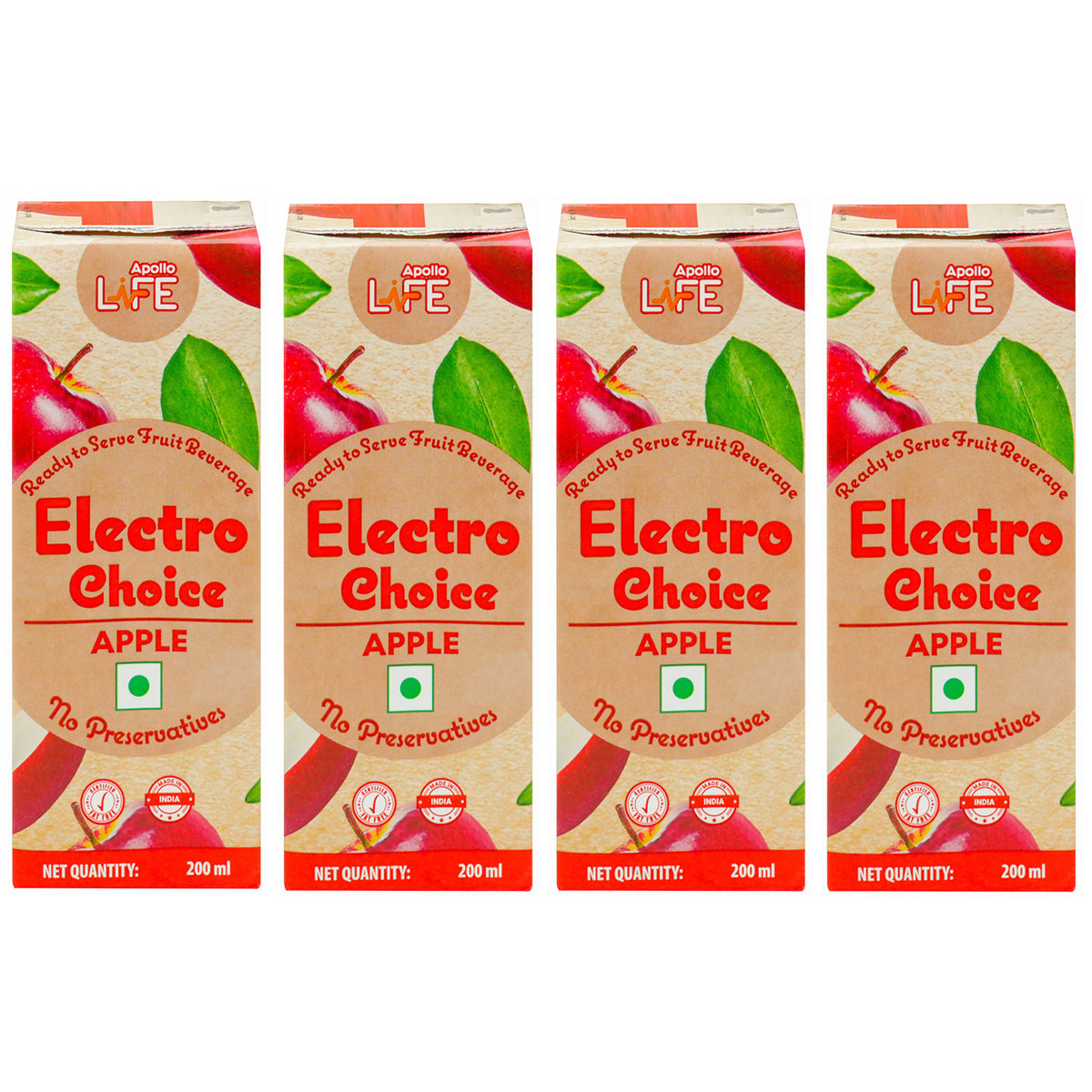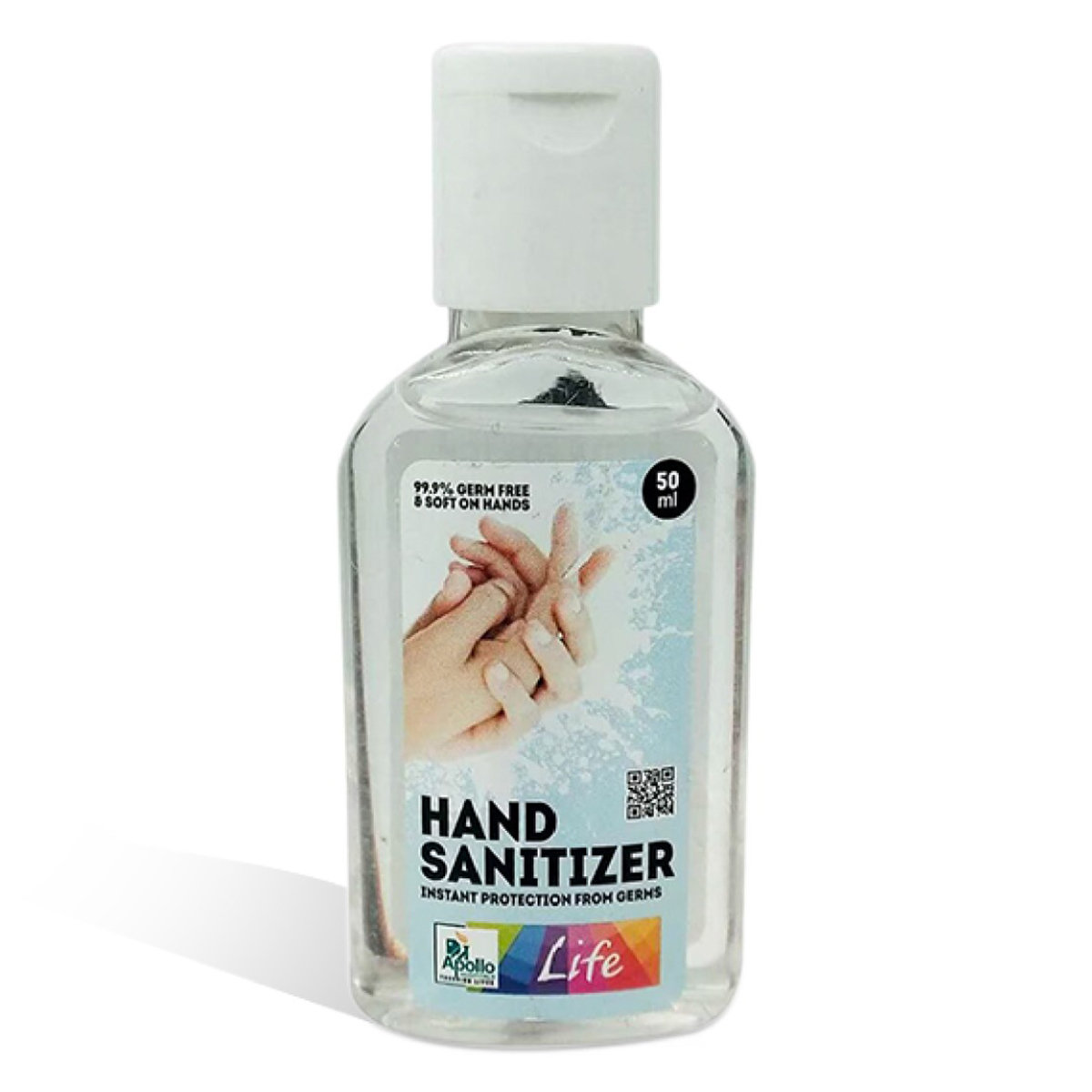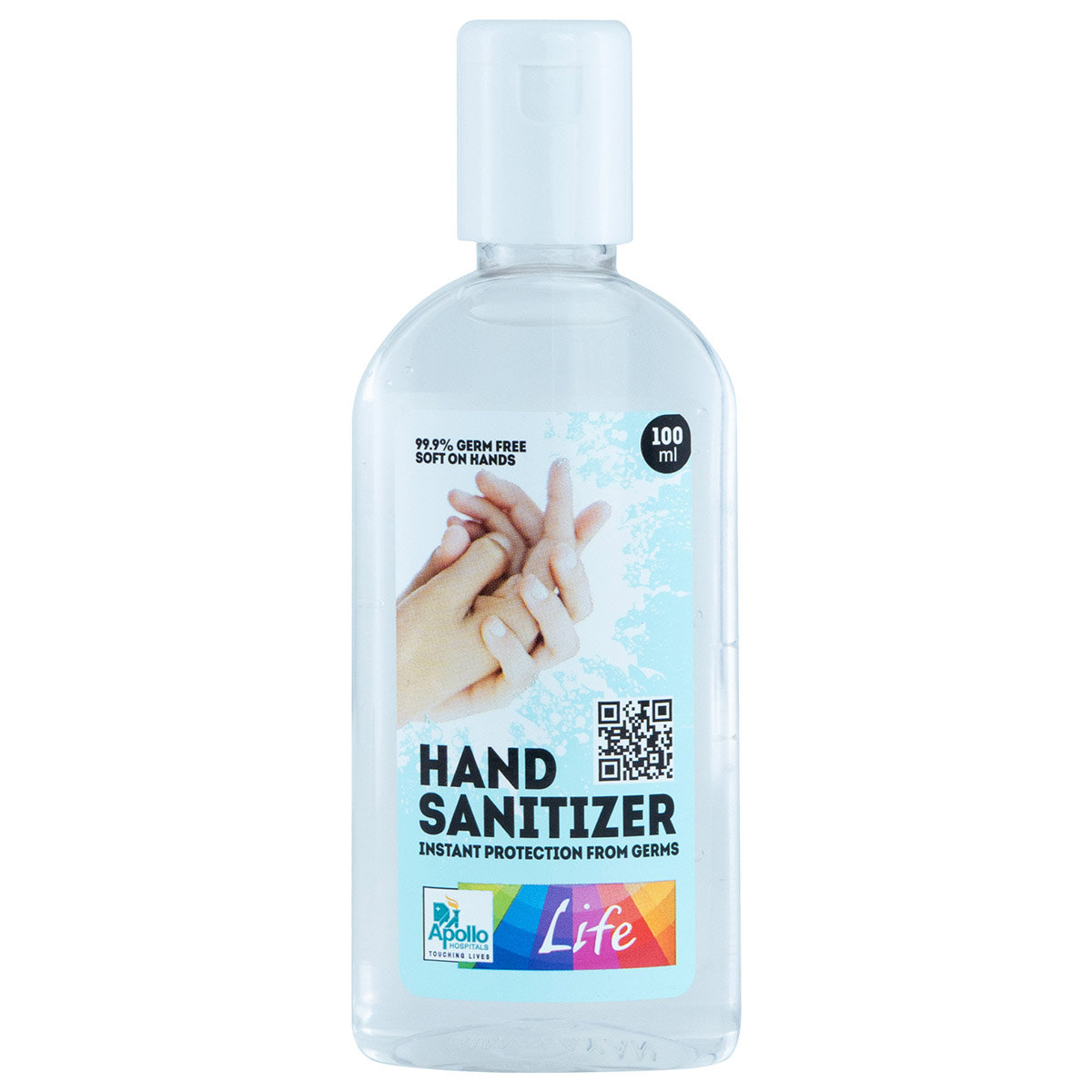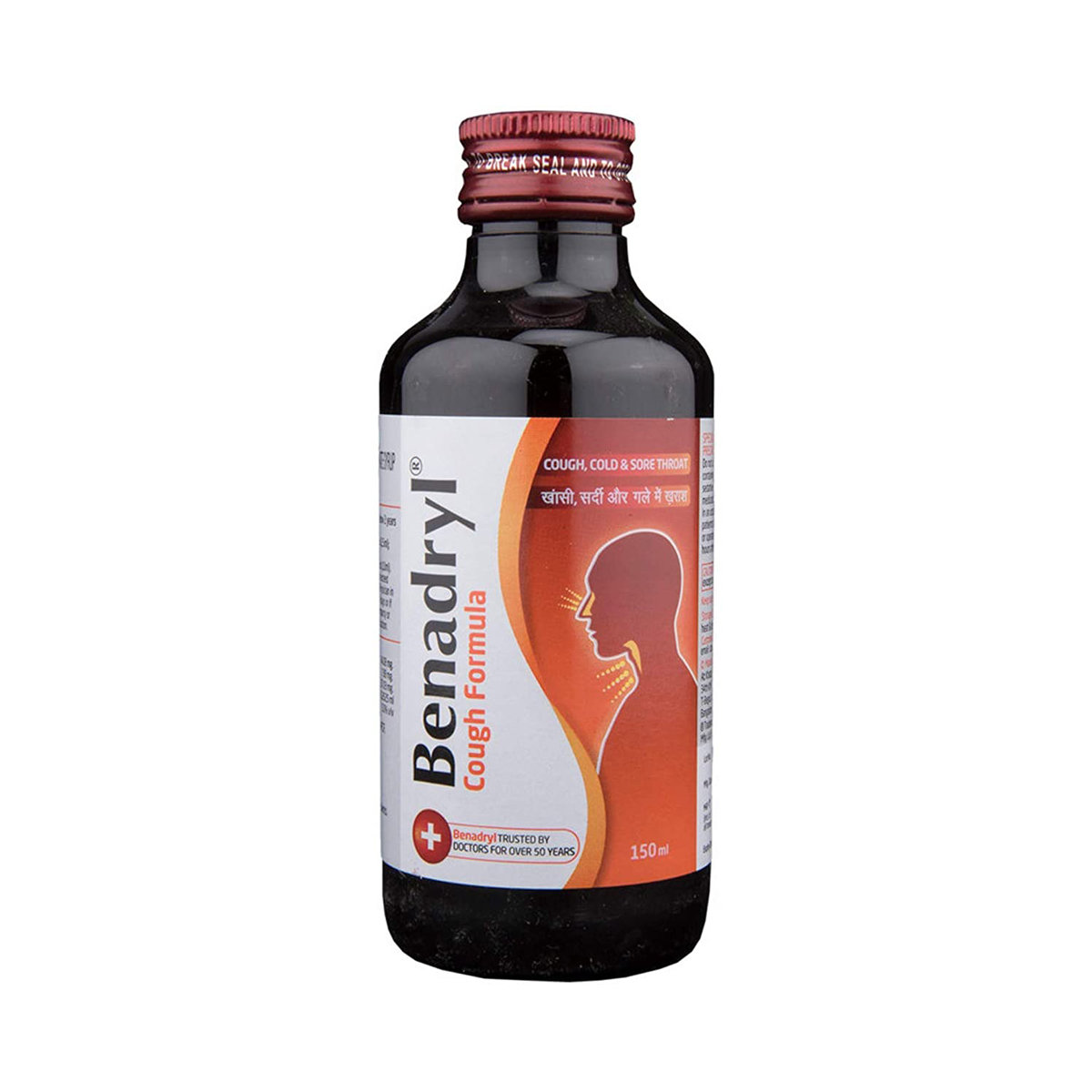Benadryl DR Syrup, 100 ml
Selected Pack Size:100 ml
100 ml ₹124.3
(₹1.24 per ml)
In Stock
50 ml ₹75.6
(₹1.51 per ml)
In Stock
MRP ₹138
(Inclusive of all Taxes)
₹20.7 Cashback (15%)
Know Your Delivery Time
Provide Delivery Location

Secure Payment

India's Most Trusted Pharmacy

Genuine Products
Composition :
Manufacturer/Marketer :
Consume Type :
Expires on or after :
Return Policy :
About Benadryl DR Syrup
Benadryl DR Syrup is used to treat a dry cough. Coughing is a natural reflex that helps remove irritants such as allergens, mucus, and smoke from the airways and prevents infections. A dry cough is irritating and does not produce mucus, whereas a wet cough generates mucus or phlegm, which helps clear the airways, typically due to infections or irritation.
Benadryl DR Syrup contains Dextromethorphan hydrobromide, which works by blocking the cough receptor present in the brain, which is known to cause cough.
The most common side effects of Benadryl DR Syrup are dizziness, drowsiness, sleepiness, confusion, and nausea. Most of these side effects do not require medical attention and typically resolve on their own over time. However, if the side effects persist or worsen, please consult your doctor.
Inform your doctor if you are allergic to Benadryl DR Syrup or any other medication. If you are pregnant or breastfeeding, please inform your doctor before starting Benadryl DR Syrup. Benadryl DR Syrup should be given to children only if prescribed by the doctor.
Uses of Benadryl DR Syrup
Benadryl DR Syrup is used in the treatment of dry cough. The detailed uses of Benadryl DR Syrup are as follows:
- Relief from dry cough: Benadryl DR Syrup provides temporary relief from dry cough caused by allergic reactions or irritants in the air.
- Soothing an irritated throat: Benadryl DR Syrup helps to soothe the throat and reduce the urge to cough, allowing for better sleep during nighttime cough episodes.
- Cough suppressant: Benadryl DR Syrup helps ease symptoms of dry, non-productive coughs caused by colds or environmental irritants like smoke, dust, or pollutants.
- Antihistamine benefits: Benadryl DR Syrup acts as an antihistamine to alleviate coughing due to upper respiratory tract allergies.

Have a query?
Directions for Use
- Benadryl DR Syrup can be taken with or without food.
- Follow your doctor's instructions on the dosage and timing of this medication.
- Swallow Benadryl DR Syrup as a whole with a glass of water.
- Do not crush, break, or chew it.
Key Benefits
- Benadryl DR Syrup is primarily used to treat a dry cough.
- It works by acting on the cough centre in the brain to reduce the urge to cough, helping provide relief from sleeplessness or discomfort caused by constant coughing.
- It is commonly used for the short-term treatment of coughs caused by colds or respiratory infections when the cough is dry and non-productive (i.e., without mucus).
How Benadryl DR Syrup Works
Storage
- Inform your doctor about the nausea and discuss possible alternatives to the medication or adjustments to the dosage.
- Divide your daily food intake into smaller, more frequent meals to reduce nausea.
- Opt for bland, easily digestible foods like crackers, toast, plain rice, bananas, and applesauce.
- Avoid certain foods that can trigger nausea, such as fatty, greasy, spicy, and smelly foods.
- Drink plenty of fluids, such as water, clear broth, or electrolyte-rich beverages like coconut water or sports drinks.
- Use ginger (tea, ale, or candies) to help relieve nausea.
- Get adequate rest and also avoid strenuous activities that can worsen nausea.
- Talk to your doctor about taking anti-nausea medication if your nausea is severe.
- Record when your nausea occurs, what triggers it, and what provides relief to help you identify patterns and manage your symptoms more effectively.
- Preventing Vomiting (Before it Happens)
- Take medication exactly as prescribed by your doctor. This can help minimize side effects, including vomiting.
- Having a small meal before taking your medication can help reduce nausea and vomiting.
- Talk to your doctor about taking anti-nausea medication along with your prescribed medication.
- Managing Vomiting (If it Happens)
- Try taking ginger in the form of tea, ale, or candy to help alleviate nausea and vomiting.
- What to Do if Vomiting Persists
- Consult your doctor if vomiting continues or worsens, consult the doctor for guidance on adjusting your medication or additional treatment.
- Inform your doctor about your constipation symptoms. They may adjust your medication or advise alternative treatments.
- Stay hydrated by drinking sufficient of water (at least 8-10 glasses a day) to help soften stool and promote bowel movements.
- Increase fibre intake by eating foods high in fibre, such as fruits, whole grains, vegetables and legumes, to help bulk up the stool.
- Establish a bowel routine by trying to go to the bathroom at the same time each day to train your bowels.
- Engaging in regular exercise, like walking or yoga, can support in bowel movement stimulation.
- Consult your doctor if constipation persists, and discuss alternative treatments or adjustments to your medication.
- Get enough sleep. Maintain a regular sleep cycle.
- Eat a healthy diet and exercise regularly.
- Manage stress with yoga or meditation.
- Limit alcohol and caffeine.
- Avoid driving or operating machinery unless you are alert.
- Inform your doctor about dizziness symptoms. They may adjust your medication regimen or prescribe additional medications to manage symptoms.
- Follow your doctor's instructions for taking medication, and take it at the same time every day to minimize dizziness.
- When standing up, do so slowly and carefully to avoid sudden dizziness.
- Avoid making sudden movements, such as turning or bending quickly, which can exacerbate dizziness.
- Drink plenty of water throughout the day to stay hydrated and help alleviate dizziness symptoms.
- If you're feeling dizzy, sit or lie down and rest until the dizziness passes.
- Track when dizziness occurs and any factors that may trigger it, and share this information with your doctor to help manage symptoms.
- Avoid driving or operating machinery or activities that require high focus until you know how the medication affects you.
- Maintain a fixed sleeping schedule, create a relaxing bedtime routine and ensure your sleeping space is comfortable to maximize your sleep quality.
- Limit alcohol and caffeine as these may worsen drowsiness and disturb sleep patterns.
- Drink plenty of water as it helps with alertness and keeps you hydrated and for overall well-being.
- Moderate physical activity can improve energy levels, but avoid intense workouts right before bedtime.
- Confusion is a major psychotic disorder that needs immediate medical attention.
- Acknowledge your experience and put effort to control confusion.
- Avoid smoking and alcohol intake as it can worsen the condition and increase your confusion.
- Practice meditation and yoga to avoid anxiety, which can be one of the leading causes.
- Talk to your dietician and consume food that can improve your mental health.
What if I have taken an overdose of Benadryl DR Syrup
Drug Warnings
- Do not take Benadryl DR Syrup if you are allergic to Benadryl DR Syrup or any of its components.
- Benadryl DR Syrup should not be stopped abruptly as it might lead to withdrawal symptoms like irritability, anxiety, diarrhoea, restlessness, and increased blood pressure.
- If your condition does not improve, your cough returns, or if a fever or rash accompanies it, please visit your doctor immediately, as this could be a serious issue.
- Also, Benadryl DR Syrup should be taken at least 15 days after your last dose of antidepressants, especially monoamine oxidase inhibitors (MAO), as taking both together may be fatal.
- If you are pregnant or breastfeeding, please inform your doctor before starting Benadryl DR Syrup.
- Please do not smoke, as it might worsen your symptoms. Let your doctor know if you are taking any other medications or if you have any pre-existing medical conditions so that they can rule out potential interactions.
- It is not recommended for children under 4 years of age.
Drug-Drug Interactions
Drug-Drug Interactions
Login/Sign Up
Co-administration of Phenelzine and Benadryl DR Syrup, 100 ml can increase the risk of serotonin syndrome (A condition in which a chemical called serotonin builds up in your body).
How to manage the interaction:
Co-administration of Phenelzine and Benadryl DR Syrup, 100 ml can lead to an interaction. However, if you experience any symptoms like confusion, hallucination, seizure, changes in blood pressure, increased heart rate, fever, excessive sweating, shivering or shaking, blurred vision, muscle stiffness, tremors, stomach cramps, nausea, vomiting, and diarrhea, consult a doctor immediately. Do not stop using any medications without a doctor's advice.
Co-administration of Benadryl DR Syrup, 100 ml and Selegiline may increase the risk of serotonin syndrome (a condition in which a chemical called serotonin builds up in your body).
How to manage the interaction:
Co-administration of Selegiline with Benadryl DR Syrup, 100 ml can possibly result in an interaction, but it can be taken if a doctor has advised it. If you notice any of these symptoms - confusion, hallucination, fits, increased heart rate, fever, excessive sweating, shivering, shaking, blurred vision, muscle spasm, stiffness, incoordination, stomach cramps, nausea, vomiting, or diarrhea - make sure to contact a doctor right away. Do not stop using any medications without talking to a doctor.
Co-administration of Pargyline and Benadryl DR Syrup, 100 ml can increase the risk of serotonin syndrome (A condition in which a chemical called serotonin builds up in your body).
How to manage the interaction:
Co-administration of Benadryl DR Syrup, 100 ml and Pargyline can lead to an interaction. However, if you experience any symptoms like confusion, hallucination, seizure, changes in blood pressure, increased heart rate, fever, excessive sweating, shivering or shaking, blurred vision, muscle stiffness, tremors, stomach cramps, nausea, vomiting, and diarrhea, consult a doctor immediately. Do not stop using any medications without a doctor's advice.
Co-administration of Benadryl DR Syrup, 100 ml and Procarbazine may increase the risk of serotonin syndrome (a condition in which a chemical called serotonin builds up in your body).
How to manage the interaction:
Co-administration of Procarbazine with Benadryl DR Syrup, 100 ml can possibly result in an interaction, but it can be taken if a doctor has advised it. If you notice any of these symptoms - confusion, hallucination, seizure, increased heart rate, fever, excessive sweating, shivering, shaking, blurred vision, muscle spasm, stiffness, incoordination, stomach cramps, nausea, vomiting, or diarrhea - make sure to contact a doctor right away. Do not stop using any medications without talking to a doctor.
Taking Tranylcypromine with Benadryl DR Syrup, 100 ml can increase the risk of serotonin syndrome (a condition in which a chemical called serotonin increases in your body).
How to manage the interaction:
Taking Benadryl DR Syrup, 100 ml with Tranylcypromine is not recommended, but can be taken together if prescribed by a doctor. However, consult a doctor if you experience confusion, hallucination(seeing and hearing things that do not exist), fit blood pressure alteration, increased heart rate, fever, excessive sweating, shivering or shaking, blurred vision, pain in the muscles or stiffness, incoordination, stomach cramps, nausea, vomiting, and diarrhea. Do not discontinue any medications without consulting a doctor.
Co-administration of Isocarboxazid with Benadryl DR Syrup, 100 ml can increase the risk of serotonin syndrome (A condition in which a chemical called serotonin builds up in your body).
How to manage the interaction:
Taking Benadryl DR Syrup, 100 ml and Isocarboxazid can lead to an interaction. However, if you experience any symptoms like confusion, hallucination, seizure, changes in blood pressure, increased heart rate, fever, excessive sweating, shivering or shaking, blurred vision, muscle stiffness, tremors, stomach cramps, nausea, vomiting, and diarrhea, consult a doctor immediately. Do not stop using any medications without a doctor's advice.
Taking Rasagiline with Benadryl DR Syrup, 100 ml can increase the risk of serotonin syndrome (A condition in which a chemical called serotonin increase in your body).
How to manage the interaction:
Taking Benadryl DR Syrup, 100 ml with Rasagiline is not recommended as it can possibly result in an interaction, it can be taken if a doctor has advised it. If you notice any of these symptoms like confusion, hallucination, fits, extreme changes in blood pressure, increased heart rate, fever, excessive sweating, shivering or shaking, blurred vision, muscle spasm or stiffness, shaking, incoordination, stomach cramps, nausea, vomiting, and diarrhea, consult a doctor. Do not discontinue any medications without consulting a doctor.
Co-administration of Benadryl DR Syrup, 100 ml with Ketamine can increase the risk of side effects such as dizziness, drowsiness, confusion, difficulty concentrating, excessive sedation, and respiratory depression.
How to manage the interaction:
Although taking Benadryl DR Syrup, 100 ml and Ketamine together can evidently cause an interaction, it can be taken if a doctor has suggested it. If you notice any of these signs - feeling dizzy, sleepy, confused, having trouble focusing, feeling too relaxed, or having trouble breathing - make sure to contact a doctor right away. Do not discontinue any medications without consulting a doctor.
Co-administration of Benadryl DR Syrup, 100 ml with Pentazocine can increase the risk of serotonin syndrome (A condition in which a chemical called serotonin builds up in your body).
How to manage the interaction:
Co-administration of Pentazocine with Benadryl DR Syrup, 100 ml can possibly result in an interaction, but can be taken together if prescribed by a doctor. However, consult a doctor if you experience confusion, hallucination(seeing and hearing things that do not exist), fits, blood pressure alteration, increased heart rate, fever, excessive sweating, shivering or shaking, blurred vision, pain in the muscles or stiffness, incoordination, stomach cramps, nausea, vomiting, and diarrhea. Do not discontinue any medications without consulting your doctor.
Co-administration of Benadryl DR Syrup, 100 ml and Venlafaxine can increase the risk of serotonin syndrome (A condition in which a chemical called serotonin builds up in body).
How to manage the interaction:
Although there is a possible interaction between Benadryl DR Syrup, 100 ml and Venlafaxine, you can take these medicines together if prescribed by a doctor. However, if you experience any of the following symptoms: confusion, hallucination, seizure, extreme changes in blood pressure, increased heart rate, fever, excessive sweating, shivering or shaking, blurred vision, muscle spasm or stiffness, tremor, incoordination, stomach cramp, nausea, vomiting, and diarrhea, seek immediate medical attention. Do not discontinue any medications without consulting a doctor.
Drug-Food Interactions
Drug-Food Interactions
Login/Sign Up
Diet & Lifestyle Advise
- Wash your hands with soap and water regularly to prevent the spread of germs.
- Eat plenty of foods rich in good bacteria, like yoghurt, to improve overall health.
- Drink plenty of fluids to avoid dehydration.
- Gargle with salt water for relief from a sore throat.
- Do not smoke, as it might worsen your symptoms.
- Avoid alcohol consumption as it may cause tiredness, drowsiness, or lack of concentration.
Habit Forming
Therapeutic Class
All Substitutes & Brand Comparisons
RX
Out of StockIndryl Plus Syrup
₹40.7
(₹0.37/ 1ml)
70% CHEAPERRX
Out of StockSuntuss DR Sugar Free Menthol-Lemon Flavour Syrup 100 ml
Suncare Formulations Pvt Ltd
₹75
(₹0.68/ 1ml)
45% CHEAPERRX
Cofsils Dry Cough Syrup 100 ml
Cipla Ltd
₹97.5
(₹0.88/ 1ml)
29% CHEAPER
Alcohol
Safe if prescribed
Avoid consumption of alcohol with Benadryl DR Syrup as it may cause increased drowsiness. Please consult a doctor before consuming alcohol with Benadryl DR Syrup.
Pregnancy
Consult your doctor
Benadryl DR Syrup belongs to pregnancy category C. Its safety in pregnancy is unknown, so it should be taken only if prescribed by a doctor.
Breast Feeding
Consult your doctor
The safety of Benadryl DR Syrup in breastfeeding women is unknown, so it should be taken only if prescribed by a doctor.
Driving
Safe if prescribed
Benadryl DR Syrup may cause drowsiness or tiredness in some people. Therefore, drive only if you are alert after taking Benadryl DR Syrup.
Liver
Consult your doctor
Take Benadryl DR Syrup with caution, especially if you have a history of liver disease. The dose may be adjusted by your doctor as required.
Kidney
Consult your doctor
Take Benadryl DR Syrup with caution, especially if you have a history of kidney disease. The dose may be adjusted by your doctor as required.
Children
Safe if prescribed
Benadryl DR Syrup is not recommended for children below the age of 4. Benadryl DR Syrup should be given to children only if prescribed by a child specialist.
Heart
Benadryl DR Syrup should be taken with caution in patients with heart problems. Please inform your doctor if you have any pre-existing heart problems.
Geriatrics
Consult your doctor
Benadryl DR Syrup should be given with caution in elderly patients due to an increased risk of side effects. Seek medical advice before using Benadryl DR Syrup.
FAQs
Benadryl DR Syrup is used to relieve a dry cough caused by cold, flu, or throat irritation.
Benadryl DR Syrup works by blocking the cough receptor present in the brain, which is known to cause cough.
To treat your condition effectually, continue taking Benadryl DR Syrup for as long as your doctor has prescribed. Do not be reluctant to speak with your doctor if your condition does not improve or if you experience any difficulty whilst taking Benadryl DR Syrup.
Benadryl DR Syrup may cause drowsiness. So, operating any machinery or driving a car, doing an activity that requires concentration and alertness, should be avoided unless you are alert.
Benadryl DR Syrup can have addictive effects if taken in more than the recommended dose. Hence, take Benadryl DR Syrup only as prescribed.
It is not recommended to take Benadryl DR Syrup along with any antidepressant medication, as it can lead to unpleasant side effects or drug interactions. Also, Benadryl DR Syrup should be taken at least 15 days after your last dose of antidepressants, especially monoamine oxidase inhibitors (MAOIs).
Benadryl DR Syrup may cause drowsiness/sleepiness. Hence, drive or operate machinery only if you are alert.
It is not known if it is safe to take Benadryl DR Syrup in schizophrenic patients. Consult the doctor before giving Benadryl DR Syrup to a patient with schizophrenia.
No, Benadryl DR Syrup is not a steroid, opiate, antihistamine, narcotic, NSAID, controlled substance, or contains alcohol or codeine. It's an antitussive medication.
Yes, Benadryl DR Syrup is safe if taken in the dose and duration prescribed by the doctor.
Benadryl DR Syrup is not known to affect blood pressure. However, it is advised to consult the doctor before starting Benadryl DR Syrup if you have high blood pressure.
It is advisable to consult a doctor before taking Benadryl DR Syrup with other medications to prevent any unpleasant side effects or interactions.
No, Benadryl DR Syrup is not an antibiotic. It is an anti-tussive agent used to treat a dry cough.
Benadryl DR Syrup starts working within a few minutes and lasts for several hours.
Yes, Benadryl DR Syrup is good for a dry cough. It treats dry cough by blocking the cough receptor present in the brain.
Benadryl DR Syrup should not be taken by people who are allergic to any of the components in Benadryl DR Syrup or if they have used an MAO inhibitor within the past 14 days.
Yes, Benadryl DR Syrup helps clear the throat and soothe a cough.
No, Benadryl DR Syrup is not banned in India.
Benadryl DR Syrup should be taken only for the duration prescribed by the doctor. If your condition persists or worsens, please consult the doctor.
Yes, Benadryl DR Syrup can be taken at night or as advised by the doctor.
Benadryl DR Syrup should be taken as advised by the doctor. The doctor will determine the dosage of Benadryl DR Syrup based on your condition.
Benadryl DR Syrup is not recommended for children below the age of 4. It should be given to children over 4 years old only if prescribed by a doctor.
Benadryl DR Syrup can be taken with or without food. Use it as advised by the doctor.
The most common side effects of Benadryl DR Syrup are dizziness, drowsiness, sleepiness, confusion, and nausea. Most of these side effects do not require medical attention and typically resolve on their own over time. However, if the side effects persist or worsen, please consult your doctor.
Country of origin
Manufacturer/Marketer address
Disclaimer
Author Details
We provide you with authentic, trustworthy and relevant information
Reference
- https://www.drugs.com/dextromethorphan.html#:~:text=Dextromethorphan%20is%20a%20cough%20suppressant,counter%20and%20prescription%20combination%20medications.
- https://www.medicines.org.uk/emc/files/pil.1523.pdf
- https://medlineplus.gov/druginfo/meds/a682492.html
- https://www.healthline.com/symptom/cough#causes

